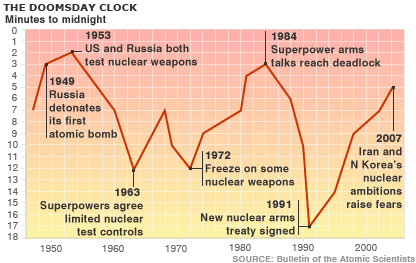Cruentus
Grandmaster
In fact, here is the home page of a very interesting website on the subject:
http://www.aip.org/history/climate/index.html
http://www.aip.org/history/climate/index.html
Follow along with the video below to see how to install our site as a web app on your home screen.
Note: This feature may not be available in some browsers.
The "where" of an object might not change its mass relative to another object but the relative speed of the object to another may change its mass. Of course, it would have to be moving along at a high velocity and its "where" would be constantly changing.The mass of an object does not change because of its relative position to another object. If Venus was anywhere else in the universe, it would have exactly the same mass as it has in orbit around the Sun.
The "where" of an object might not change its mass relative to another object but the relative speed of the object to another may change its mass. Of course, it would have to be moving along at a high velocity and its "where" would be constantly changing.
Ray said:On the subject of global warming: How come the doomsaying scientists and political leaders don't ride their bikes to their conventions? How come Al Gore doesn't jog to his "events?"

What was intended as a gentle correction of an error results in an accusation and insult. OK then ... so here is the language.....
Whether we agree or not, is pretty irrelevant at this point, isn't it? When you seem to wish to paint me with the radical right code word 'Al Gore'. The only reference in this thread to Al Gore is your post.
I heard something interesting on the radio the other day, thought I'd bounce it around a bit. I wish I could remember who said it.
It was an interesting perspective I've not heard before on things. Who says that the temperature we now have on Earth is ideal? Temperatures in the past have flucuated dramatically, long before man made his grand appearance. Things like solar cycles, volcanic activity have led to dramatic temperature ranges. Ice ages, long periods of warmer temperatures, etc.. Sea levels have not been static either. Why are we trying to halt the rise or fall of global temperatures?
I can understand our desire to slow down polution. That only makes sense. But even with no polution, we don't live in a world with static temperatures. Should that be our motivation to try and clean things up? Also, why should we see ourselves as the ultimate judges of what the "correct" temperature is? If we enter a new ice age in 50 years, should we start producing more green house gasses?
How does comparing Earth to Venus apply to that post?
How does comparing Earth to Venus apply to that post?
Here's one quick reference: http://math.ucr.edu/home/baez/physics/Relativity/SR/mass.htmlMass is not relative to any other thing, so I don't quite understand what you are arguing.
The mass of Venus is the equal to itself. It would be equal to itself where ever it is in the universe and no regardless of what objects it is near, away from, moving toward or moving away. Mass is the measure of how much 'stuff' makes up the planet Venus.
So, if you can shed some light on more specifically what you are referencing, I am interested.
Of the two, the definition of invariant mass is much preferred over the definition of relativistic mass. These days, when physicists talk about mass in their research, they always mean invariant mass. The symbol m for invariant mass is used without the subscript 0. Although the idea of relativistic mass is not wrong, it often leads to confusion, and is less useful in advanced applications such as quantum field theory and general relativity. Using the word "mass" unqualified to mean relativistic mass is wrong because the word on its own will usually be taken to mean invariant mass. For example, when physicists quote a value for "the mass of the electron" they mean its invariant mass.
